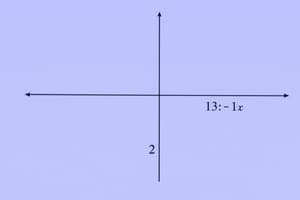Podcast
Questions and Answers
If the highest power of x is in the numerator, then the limit will equal...
If the highest power of x is in the numerator, then the limit will equal...
- Infinity or negative Infinity (correct)
- Zero
- The ratio of the coefficients
- That number
If the highest power of x is in the denominator, what will the limit equal?
If the highest power of x is in the denominator, what will the limit equal?
zero
If the highest power of x is in both the numerator and denominator, what does the limit equal?
If the highest power of x is in both the numerator and denominator, what does the limit equal?
the ratio of the coefficients of those terms
If f(c) equals a number, what will the limit equal?
If f(c) equals a number, what will the limit equal?
If f(c) equals a number/0 where the number is not 0, what can the limit be?
If f(c) equals a number/0 where the number is not 0, what can the limit be?
What must you do if f(c) is 0/0?
What must you do if f(c) is 0/0?
You can use direct substitution for limits of piecewise functions.
You can use direct substitution for limits of piecewise functions.
After using direct substitution, if the answer is a real number for absolute value functions, what is the limit?
After using direct substitution, if the answer is a real number for absolute value functions, what is the limit?
If after direct substitution, the answer is 0/0 for absolute value functions, what should you check?
If after direct substitution, the answer is 0/0 for absolute value functions, what should you check?
You can use direct substitution for limits of greatest integer functions.
You can use direct substitution for limits of greatest integer functions.
Flashcards are hidden until you start studying
Study Notes
Limits to Infinity
- When the highest power of x is in the numerator, the limit approaches either infinity or negative infinity, influenced by the leading coefficient and the specific conditions of the limit.
- If the highest power of x is in the denominator, the limit equals zero.
- With the highest power of x in both the numerator and denominator, the limit is determined by the ratio of the coefficients of those terms.
Limits to a Number C
- When f(c) gives a specific number, the limit equals that number.
- If f(c) results in a non-zero number over zero, the limit may be infinity or negative infinity depending on one-sided limits. If both one-sided limits are positive, the limit is infinity; if both are negative, it is negative infinity.
- When the one-sided limits diverge, the limit does not exist (DNE).
- For an indeterminate form of 0/0, apply algebraic techniques (like factoring) to simplify the function before reevaluating the limit by substituting c.
Limits of Piecewise Functions
- Direct substitution is not applicable; both one-sided limits must be assessed as x approaches c.
- The left-hand limit utilizes the function for x < c and the right-hand limit for x > c.
- If the one-sided limits are equal, that value is the limit; if they differ, the limit DNE.
Limits of Absolute Value Functions
- After direct substitution results in a real number, the limit is that number.
- Upon obtaining 0/0, both one-sided limits should be checked. If approaching c from the positive side, remove absolute value bars; if from the negative side, replace the inside of the absolute value with its negative before solving.
- The limit exists if both one-sided limits are equal; if not, it DNE.
Limits of Greatest Integer Functions
- Direct substitution cannot be used; instead, assess both one-sided limits as x approaches c.
- The right-hand limit of [x] approaches c; the left-hand limit approaches the greatest integer less than c.
- Equality of the one-sided limits determines the overall limit; differing results indicate that the limit DNE.
Studying That Suits You
Use AI to generate personalized quizzes and flashcards to suit your learning preferences.




